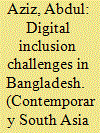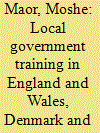|
|
|
Sort Order |
|
|
|
Items / Page
|
|
|
|
|
|
|
| Srl | Item |
| 1 |
ID:
176576


|
|
|
|
|
| Summary/Abstract |
This study assesses the impact and effectiveness of the National Information and Communications Technology Policy (NIP) in Bangladesh, which is a key legal framework for ‘Vision 2021’ and ‘Digital Bangladesh’. It investigates the extent to which digital inclusion can be achieved by the NIP strategies, as well as exploring the conceptualisation of digital inclusion, which undergirds the contemporary debate on the digital divide and inclusion. The study employs a qualitative approach using policy goal-means analysis to explore critical scrutiny of the internal rationality and logic of the NIP based on three distinct criteria of the digital inclusion analytical framework: ICT access, use and skills. The analysis argues that the policy is ambiguous and techno-centric, with a narrow digitisation frame of reference, which does not comprehensively address the issues associated with digital inclusion. Policy needs to be consistent and relevant to a person’s daily life, giving the user a sense of empowerment and skill. The article concludes that a focus on a skill-based approach and the context of societal challenges of Bangladesh is crucial to ensuring digital inclusion.
|
|
|
|
|
|
|
|
|
|
|
|
|
|
|
|
| 2 |
ID:
160540


|
|
|
|
|
| Summary/Abstract |
This study reviews the developments in Indonesia’s labour markets during the Joko “Jokowi” Widodo presidency. It is set in the context of changing employment, wages and productivity since the Asian Financial Crisis and under the previous (Yudhoyono) government. We argue that Jokowi’s approach as a former businessman—aided by his like-minded vice-president, Jusuf Kalla—together with macroeconomic developments, has been positive for employment and wages, although less so for labour productivity. Formal sector jobs have continued to grow rapidly and recover somewhat in manufacturing, while the downward trend in unemployment has been sustained. Reform of the minimum wage setting processes has not endeared the president to vocal union groups, but appears to have moderated minimum wage increases close to the main industrial centres. At the same time, a wider wage gap has emerged between permanent and casual workers, which could have contributed to the rising inequality in the country. In an attempt to boost productivity, the current administration has put considerable effort into improving skills that are in demand. However, progress is likely to be slow mainly because of the low quality of basic schooling.
|
|
|
|
|
|
|
|
|
|
|
|
|
|
|
|
| 3 |
ID:
096940


|
|
|
|
|
| Publication |
2010.
|
| Summary/Abstract |
This article highlights an interesting and often unduly neglected aspect of comparative public policy and administration: local government training. The argument advanced is that local government training based on the centrally focused model may tend to be: (i) skill-oriented and competence-framed; (ii) comprehensive; and (iii) quality-controlled in a relatively rigorous manner. By contrast, local government training based on the locally focused model may tend to be: (i) skill-oriented and competence-framed alongside a focus on 'people' and organizational issues, conventional policy issues and broad local government issues; (ii) non-comprehensive, and (iii) weakly controlled for quality. The integrative model, which is the most innovative form of the three models presented here, may tend to manifest a varied mix of the aforementioned features. Based on an institutional analysis combined with interviews with senior training officials at national and local levels, this argument is illustrated in England and Wales, Denmark and Israel in the hope that it could be a starting point for developing hypotheses and propositions.
|
|
|
|
|
|
|
|
|
|
|
|
|
|
|
|
| 4 |
ID:
153751


|
|
|
|
|
| Summary/Abstract |
The paper analyzes the foreign practice of CALS (Continuous Acquisition and Lifecycle Support) contracts. It offers a conceptual model of controlling the life cycle of products, which is to include the professional training of communication combat unit personnel of Navy surface ships (SS). It recommends creating a virtual learning environment for Navy specialists when taking up end-to-end lifecycle contracts. The authors conclude that these measures are necessary.
|
|
|
|
|
|
|
|
|
|
|
|
|
|
|
|
| 5 |
ID:
188448


|
|
|
|
|
| Summary/Abstract |
Using the mobility restrictions implemented by Malaysia during the COVID-19 pandemic as a case study, this paper relies on detailed data on employment patterns and on the possibility to work from home and without physical proximity to estimate the extent and distribution of jobs most vulnerable to mobility restrictions. It finds that about 64.5 per cent of jobs in Malaysia cannot be performed from home, after adjusting for Internet access, while about 50.9 per cent of jobs require high levels of physical proximity. These are the jobs that are most vulnerable to strict mobility restrictions, such as those imposed during the pandemic. Workers most at risk are primarily those with relatively low education, low level of income and advanced or very young age. Jobs in less developed regions of Malaysia are also particularly vulnerable. Against this backdrop, the paper argues that Malaysia’s experience during the COVID-19 pandemic provides some vital lessons in supporting those who are most vulnerable to job losses during mobility restrictions. These lessons include improving the targeting of cash transfers, scaling up wage subsidies in supporting worker retention and hiring and leveraging upskilling/reskilling initiatives with a focus on non-routine cognitive analytical and interpersonal skills.
|
|
|
|
|
|
|
|
|
|
|
|
|
|
|
|
|
|
|
|
|